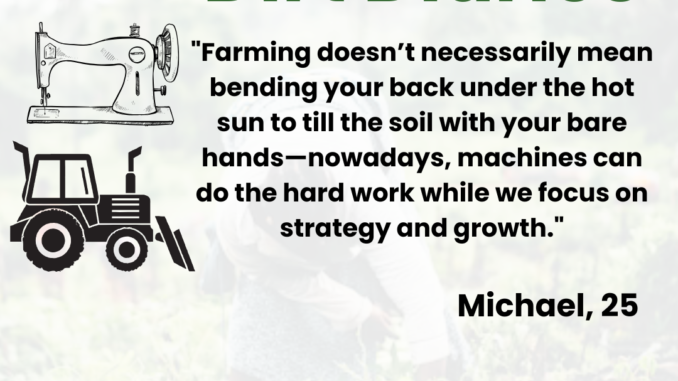
Every week, Hivemaa digs deep into the lives of ordinary but extra-ordinary farmers in Dirt Diaries to share the inspirational stories and experiences of farmers.
Farming and tailoring may seem like worlds apart, but for Michael, they are two sides of the same coin—passion and perseverance. As a Mass Communication graduate, a bespoke tailor, and a dedicated farmer, he has mastered the art of balancing creativity with cultivation. In this conversation, he shares his journey, challenges, and insights into modern farming, proving that success thrives where innovation meets hard work.
Can you introduce yourself?
Good morning, my name is Michael. I am a graduate of Mass Communication from a university in North Central Nigeria and a Bespoke Tailor located in the heart of my Town.
Interesting! (and) a farmer! You left that out. How do you balance your time between tailoring and farming?
I've been asked this a lot, and I think the basic answer is this: Money makes the world go round. Farming doesn’t necessarily mean bending your back under the hot sun to till the soil with your bare hands. Nowadays, farming can be done mechanically. There are machines that prepare soil beds, plant seedlings, and even harvest crops—all that’s needed is human resources to control them. Alternatively, you can pay laborers to handle these tasks, thereby creating more job opportunities (there’s a local name in my language for such workers).
Fair Point, What type of crops or livestock do you farm? Why did you choose them?
I am into crops and livestock farming. My dad, the Director of Anonymous Farms and Enterprises, manages both livestock and crops.
What are some challenges you've faced in your agricultural journey?
It’s no secret what the herdsmen crisis has done to the people of Benue State. We had to abandon a large farmland around Adaka, along Naka Road in Benue State due to repeated attacks by armed bandits. Last year, poor rainfall affected not just me but almost every farmer in Nigeria. Many crops died due to little or no rainfall, and I knew it would affect food availability in huge quantities this year. Also, not every soil type is good for every crop. When I hire land to farm, local people and road users sometimes assist in cultivation.
Have you considered soil analysis before farming?
Yes, I’ve done that before, but that was years ago.
Why haven’t you continued with it?
Well, aside from the cost, most of the land available for rent doesn’t belong to me. If I test the soil and find it’s unsuitable, I’ll have wasted money on land I don’t own.
That makes sense. How do you decide what to plant?
Experience has helped me understand which crops grow best in certain areas.
What do you think about modern farming techniques?
They are great, but many small-scale farmers can’t afford them. That’s why traditional methods are still widely used.
What are your future plans in farming?
I want to expand my farm and improve my mechanization—using better irrigation and storage techniques. I also want to create a cooperative where farmers can pool resources and access modern technology together.
Any advice for young people interested in farming?
Farming is not just about planting and harvesting. You need to study the market, understand soil types, and learn proper techniques. Also, start small and grow gradually. Farming requires patience and planning, so don’t rush into it without research.
Leave a Reply